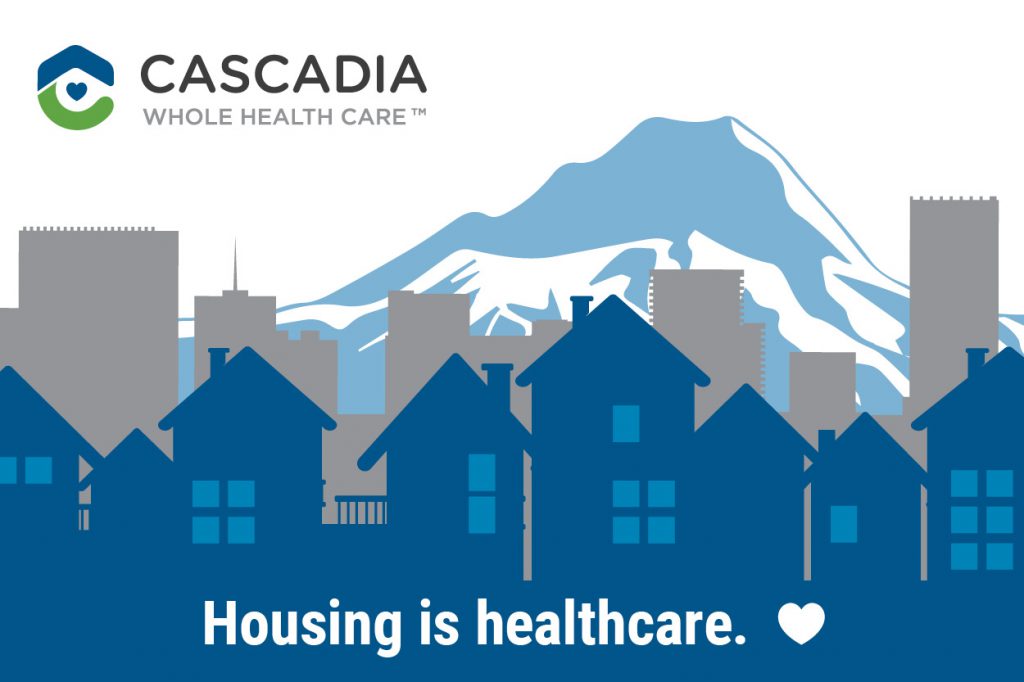September 18, 2019
Two New Supportive Housing Projects Awarded

Cascadia Behavioral Healthcare has beeen awarded two new supported housing projects, as announced September 17 by Mayor Wheeler and the Portland Housing Bureau. Cascadia will partner with Community Partners for Affordable Housing on The Joyce, and with Hacienda on the Las Adelitas.
Both of these projects were part of nine new projects which now meet—and in some cases exceed—all of the goals set forth under Portland’s Housing Bond.
The Joyce will be a rehab and renovation project with 66 units for chronically homeless adults and communities of color. Cascadia will provide services in collaboration with NARA and CAP to the community, as well as property manage the building. Las Adelitas is a new construction with 141 units for families, including immigrant and refugee experiencing homelessness. Cascadia will provide services to this community as well.
More from Portland Housing Bureau:
In 2016, voters approved the bond measure dedicating $258.4 million to create 1,300 units of permanently affordable housing. The nine projects announced today join two other projects that are already open and one currently in development for a total of 1,424 units of bond-funded housing complete or in progress across the city – exceeding the overall goal for the funding by more than 100 units.
“Portland voters passed our city’s first-ever affordable housing bond because, as Portlanders, we share the belief that we all deserve a healthy, safe and affordable place to live and to call home,” Mayor Wheeler said. “Meeting these goals and delivering on our promise to voters reflects our collective resolve and commitment to addressing the needs of Portlanders most impacted by the housing affordability crisis.”
With the addition of these projects to the pipeline, the City is also set to meet or exceed its commitments to ensure that 650 of the units would provide family-size housing, 600 would be affordable to households below 30% of Area Median Income (AMI), and 300 would provide Permanent Supportive Housing (PSH) for chronically homeless individuals and those with disabilities.
The new projects were selected through the Bond Opportunity Solicitation (BOS), released by the Housing Bureau in April. Utilizing new authority to leverage public-private partnerships from a 2018 constitutional amendment, the BOS marked the first time private and non-profit entities have had the opportunity to bid for project funding from Portland’s Housing Bond.
The total funding awarded from the BOS includes $115.3 million from Portland’s Housing Bond, as well as $4 million from Multnomah County. Home Forward additionally committed rent support for more than 250 of the new units. In partnership with the Joint Office of Homeless Services, the County will also be committing funding for services to support the community-wide effort to create more Permanent Supportive Housing.
“I’m proud that we’re prioritizing our dollars from as many sources we can. Our goal is to permanently end someone’s homelessness and fulfill our promise on supportive housing,’’ said Chair Deborah Kafoury. “Housing is the only real answer. It’s as true for a family struggling to make rent, as it is for someone struggling outside with an addiction. A home that’s affordable, with the right support, is how we break the cycle of addiction.’’
The new projects will add approximately 930 units of affordable housing, including 443 at 30% AMI, 329 units of family-size housing, and 254 units of PSH.
“These 12 projects made possible so far by Portland’s Housing Bond represent over 2,900 Portlanders who will have the safety and security of a home they can afford,” said Portland Housing Bureau Director Shannon Callahan. “They are children who will have a stable place to grow up in a neighborhood that offers them opportunities, seniors on fixed incomes living with dignity and peace of mind, and our homeless neighbors getting a new start and a chance to live safely off the streets. Together with our partners, we are creating new housing across the city to serve and support the diverse needs of our community.”
Currently, approximately $45 million from the original $258.4 million remains unallocated for future investment.
